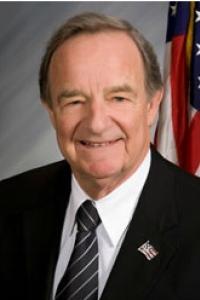NRA Leaders
Member Profile

Johnny Nugent
Board Member
Biography
Johnny Nugent has served in the Indiana State Senate since 1978 and is a former Republican Majority Floor Leader. Nugent authored a bill that prohibits municipalities in Indiana from preempting state firearm laws that was enacted into law during the 2011 legislative session. In 2009, Nugent introduced a bill that would have prohibited Indiana public colleges and universities from banning firearms from campus. Nugent has also expressed disappointment over a policy that prohibits visitors to the Indiana Statehouse from carrying concealed firearms. Legislators are exempt from the policy, however, and Nugent has revealed that he carries guns into the statehouse. The NRA Political Victory Fund endorsed his candidacy for the Indiana Senate in 2010 and gave him an “A+” rating. Outside of his role in the legislature, Nugent works as a tractor salesman.
All Statements (7 total)
- On February 17, 2015, Nugent published an editorial in Indianapolis Monthly entitled, “My Gun Story: The Legislator.” In it, he wrote, “There are a few bills I’m particularly proud of. One, [Indiana was] the first in the nation to have a lifetime concealed-carry permit. As long as you remain a good guy, it will never expire. The second is the Castle Doctrine. If you believe someone is about to do you bodily harm anywhere, you have the right to defend yourself. That includes situations with police officers and everybody else. And we just passed a bill last session that allows guns in school parking lots if they are locked in a vehicle and out of sight. That’s a good one. I believe what would endanger kids is to have a gun-free zone. Criminals don’t obey the laws. Anybody with criminal intent loves gun-free zones.” Despite Nugent’s claims, one study found that only one-third of mass shootings (in which four or more innocents are killed) occurring between January 2009 and January 2013 occurred in “gun-free zones.” Nugent concluded by saying: “Yes, I’ve carried a gun into the Statehouse in the past. Why? Because I can. It’s America. A wise old gentleman told me once, ‘A person should either carry all the time or not at all.’ His reasoning was this: The day you don’t carry is the day something bad is going to happen.” (Education, Political Violence, Vigilantism)
2015-02-17
In May 2011, the Indiana Supreme Court held that individuals do not have a right to use force to resist police officers who enter a home illegally. The ruling, which is consistent with laws in most other states, precipitated an increase in threats against police officers and judges. The Indiana Supreme Court ruled that a civil lawsuit against a police department was preferable to a violent confrontation when the legality of a police visit is in dispute. Nugent, who vowed to fight the ruling in the state legislature, said, “Hoosiers should not feel powerless in their own homes. They must be able to protect themselves and their families when they think it’s needed.”
2015-02-17
In 2003, Nugent supported legislation that would have required public schools in Indiana to conspicuously display the words, “In God We Trust.”
2015-02-17
In 2002, Nugent was arrested for driving under the influence. He registered a blood alcohol content of .13, which is well over Indiana’s .08 limit. Police stopped Nugent after receiving a report that he was driving erratically. Nugent apologized for his conduct, but also said that he “felt fine” and that he “didn't really drink any more wine at dinner than regularly.”
2015-02-17
In 1997, Nugent sponsored legislation to ban same-sex marriages in Indiana. The bill was signed into law that year.
2015-02-17
In 1996, Nugent led opposition to a proposed piece of legislation that would have “made it illegal for adults to leave a loaded handgun where children could have easy access to it.”
2015-02-17
Statements by Category (7 total)
Sources [1]
Sources [1]
Sources [1]
In May 2011, the Indiana Supreme Court held that individuals do not have a right to use force to resist police officers who enter a home illegally. The ruling, which is consistent with laws in most other states, precipitated an increase in threats against police officers and judges. The Indiana Supreme Court ruled that a civil lawsuit against a police department was preferable to a violent confrontation when the legality of a police visit is in dispute. Nugent, who vowed to fight the ruling in the state legislature, said, “Hoosiers should not feel powerless in their own homes. They must be able to protect themselves and their families when they think it’s needed.”
Sources [1]
In 2003, Nugent supported legislation that would have required public schools in Indiana to conspicuously display the words, “In God We Trust.”
Sources [1]
In 2003, Nugent supported legislation that would have required public schools in Indiana to conspicuously display the words, “In God We Trust.”
Sources [1]
In 2002, Nugent was arrested for driving under the influence. He registered a blood alcohol content of .13, which is well over Indiana’s .08 limit. Police stopped Nugent after receiving a report that he was driving erratically. Nugent apologized for his conduct, but also said that he “felt fine” and that he “didn't really drink any more wine at dinner than regularly.”
Sources [1]
In 1997, Nugent sponsored legislation to ban same-sex marriages in Indiana. The bill was signed into law that year.
Sources [1]
In 1996, Nugent led opposition to a proposed piece of legislation that would have “made it illegal for adults to leave a loaded handgun where children could have easy access to it.”
Sources [1]